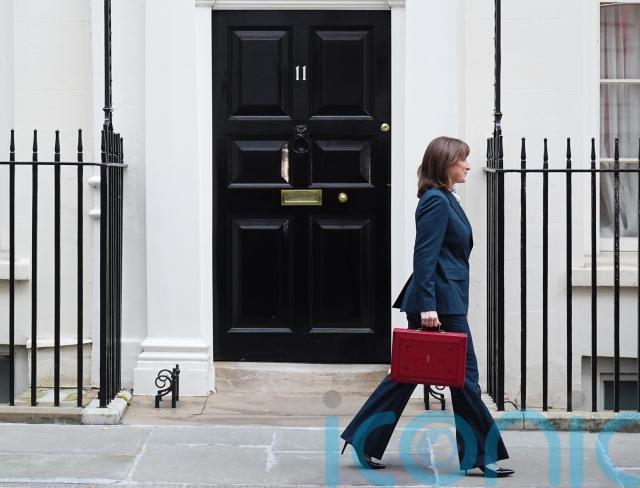
Rachel Reeves has announced tax rises amounting to £26 billion as she battles a downgrade in forecast economic growth.
More than 1.7 million people will face paying more income tax as she froze thresholds, meaning people will be dragged into paying the tax for the first time or shifted into higher bands as earnings increase.
The measures contribute to a tax burden that will rise to an “all-time high” in 2030/31.
The Office for Budget Responsibility (OBR) forecast gross domestic product would grow by 1.5% this year, an increase from its earlier 1% forecast.
But it downgraded growth in 2026 from 1.9% to 1.4%, in 2027 from 1.8% to 1.5%, in 2028 from 1.7% to 1.5% and in 2029 from 1.8% to 1.5%.
In an unprecedented blunder, full details of Ms Reeves’s plans were published by the OBR more than half an hour before she stood up in the Commons chamber.
The OBR confirmed Rachel Reeves’s Budget “raises taxes by amounts rising to £26 billion in 2029/30, through freezing personal tax thresholds and a host of smaller measures”.
The freeze in thresholds will result in 780,000 more basic-rate, 920,000 more higher-rate, and 4,000 more additional-rate income tax payers in 2029/30. Scotland has a separate income tax system.
The policy, which applies to income tax and national insurance contributions, will rake in £8.3 billion for the Exchequer in 2029/30 and the freeze will extend to 2030/31.
Other personal tax changes include £4.7 billion through charging national insurance on salary-sacrificed pension contributions, and £2.1 billion through increasing tax rates on dividends, property and savings income by two percentage points.
Ms Reeves acknowledged the freeze in tax thresholds would hit “working people” – the group Labour had promised to protect – but she was “asking everyone to make a contribution”.
“I can keep that contribution as low as possible because I will make further reforms to our tax system today to make it fairer and to ensure the wealthiest contribute the most,” she said.

The combination of measures means that tax as a share of the economy – the tax-to-GDP ratio – will “increase to an all-time high of 38.3%” in 2030/31.
The Chancellor insisted the downgraded growth forecasts were “the Tories’ legacy, not Britain’s destiny” after the OBR lowered its expectations for productivity growth by 0.3 percentage points.
Measures in the Budget include:
– Changes to green levies will save £150 on the average household energy bill from April next year.
– The amount of headroom the Government has against the Chancellor’s day-to-day spending rule will widen to £21.7 billion in 2029/30, almost £12 billion more than in March.
– The 5p cut in fuel duty will remain in place until September 2026, when it will be reversed through a staggered approach.
– Drivers of battery electric cars will be hit by a 3p per mile tax from April 2028, with the charge to rise annually with inflation.
– The two-child benefit cap is being removed at an estimated cost of £3 billion by 2029/30.
– A high-value council tax surcharge on properties worth more than £2 million will raise £0.4 billion in 2029/30.
– Debt will rise from 95% of GDP this year to 96.1% by the end of the decade.
– Consumer Prices Index inflation is forecast to be 3.5% this year, higher than the 3.2% forecast in March, and 2.5% next year, higher than the 2.1% previously forecast, before settling at 2%.
– Unemployment is also forecast to be higher than previously forecast until 2029, peaking at 1.8 million next year.
Tory leader Kemi Badenoch said the Budget was a “total humiliation” for Rachel Reeves and “if she had any decency she would resign”.
The OBR document is not meant to be released until after the Chancellor has delivered her Budget in the House of Commons.
But it was published on the Budget watchdog’s website early, the latest in a series of leaks and early disclosures in the run-up to Ms Reeves’s statement.
A link to our Economic and fiscal outlook document went live on our website too early this morning. It has been removed.
We apologise for this technical error and have initiated an investigation into how this happened.
We will be reporting to our Oversight Board, the Treasury,…
— Office for Budget Responsibility (@OBR_UK) November 26, 2025
The OBR apologised, blaming a “technical error”.
Shadow chancellor Sir Mel Stride said it was an “utterly outrageous” leak of market-sensitive information, which could constitute a criminal act.
Ms Reeves said it was “deeply disappointing” and a “serious error on their part”.
Subscribe or register today to discover more from DonegalLive.ie
Buy the e-paper of the Donegal Democrat, Donegal People's Press, Donegal Post and Inish Times here for instant access to Donegal's premier news titles.
Keep up with the latest news from Donegal with our daily newsletter featuring the most important stories of the day delivered to your inbox every evening at 5pm.